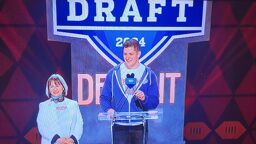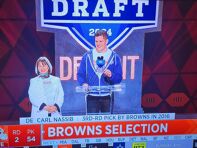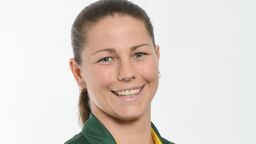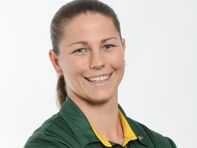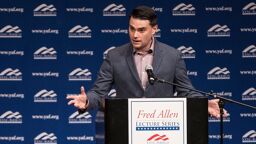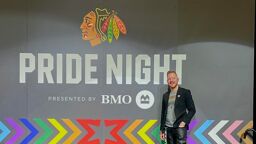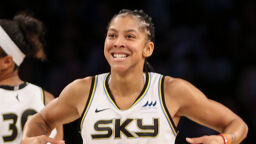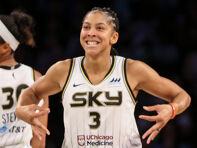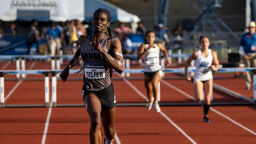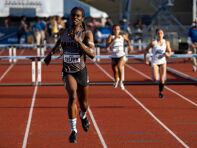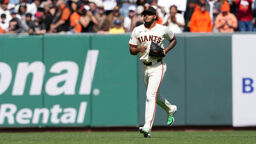Ryan Atkin was running the line as an assistant referee operating just below the Premier League when the Rainbow Laces campaign was launched in English soccer back in 2013.
Within the world of the men’s professional game, the then-28-year-old was closeted, having seen little to no evidence that LGBTQ people like him would be welcomed in his sport if they came out.
The topic wasn’t quite taboo at the time — the Football v Homophobia campaign had been running for a few years — but it had proved difficult to engage influential players.
Suddenly, footballers were being asked to wear rainbow laces in their boots to demonstrate their allyship towards any fellow players who might be gay. The novelty of the exercise meant that many did in that first year, and Rainbow Laces became a major talking point.
Looking back, Atkin admits the visibility and surge of interest in the campaign made him nervous at the time.
Yet, four years later, he was publicly sharing his personal story, becoming the first man in British pro football with an on-the-field role to come out for 27 years.
The news, broken in an exclusive interview by broadcaster Sky Sports — which had signed up as a Rainbow Laces partner in 2016 — made global headlines. Having shifted in officiating from an assistant role to being the man in the middle, Atkin was no longer fazed by the prospect of being described as ‘the gay referee’.
In fact, he has embraced the opportunity to proudly represent his community. The awareness generated by Rainbow Laces, which is run by the UK charity Stonewall, has given additional context to his story and he also serves in an ambassadorial role as a Stonewall Sport Champion.
The Premier League — thought to be the world’s most-watched sports league — has significantly amplified Rainbow Laces in recent seasons, with all 20 clubs having a designated home game across two match rounds.
This weekend marks the start of that annual activation in the English men’s elite game but once again, there will be no out gay or bi players taking to the pitch.
There has been one moment of representation in the EFL, the three professional divisions below the top-flight — teenage striker Jake Daniels came out publicly as gay in 2022, making a significant impact.
The 18-year-old is still in the development squad, below the first-team squad, at his club Blackpool FC. That means Atkin, who acts as a fourth official in EFL fixtures, remains the only out gay man regularly involved in the matchday action in the English men’s pro game today.

Such is the state of play. So what’s the purpose of Rainbow Laces a decade in?
In men’s football, the focus has always leaned towards showing allyship and starting constructive conversations. That’s as necessary now as ever, insists Atkin.
“When I came out in 2017, the campaign was certainly a supporting mechanism,” he tells Outsports.
“It showed that men’s football wanted to adopt LGBTQ inclusion, and that this wouldn’t just be about me going it alone.
“It was an early catalyst but eventually, it would become an integral part of my career. Often when people talked to me, and even now to some extent, they will ask me about Rainbow Laces because of my close association with it.
“Without a dedicated, league-led campaign activation in the calendar, I feel this part of inclusion wouldn’t get much coverage because LGBTQ visibility simply isn’t there otherwise.”
Among Atkin’s reasons for going public was his desire to be an advocate for all forms of inclusion and take part in the fight against discrimination.
He takes charge of Women’s Super League matches as well as officiating in men’s games and explained that he would feel uncomfortable when speaking about equality and diversity without mentioning — when relevant to do so — that he happens to be in a minority himself as a gay man.
Fielding multiple interview requests in the days and weeks that followed his coming out convinced him there was an audience that wanted to hear about lived experiences like his own.
“The fact my story was picked up in so many different countries and by so many media outlets, and for that to happen for a referee to come out — let alone a player — was something that was really informative.
“There’s often negative press and social media when someone comes out publicly, with those comments we see like ‘is this really news?’
“But when football is your life, you recognize and understand how limited that visibility really is within the men’s game when it comes to sexuality. I’ve been more than happy to represent ever since.”
Over the years, the lens has widened. Rainbow Laces is now promoted across all major sports in the UK at this time of year, with national governing bodies and local leagues and associations using their social media channels alongside other activations to amplify the message. Analysis shows around 12 million adults in the UK see the campaign every year.
It’s pitched a little differently from its earliest days when the aim was to show support for any of the thousands of male professional footballers who might be closeted and struggling with their sexuality.
Now it’s an opt-in initiative for anyone with a role in sport, with the laces sold to raise money for charity. You can buy pairs in a range of different Pride flag colors; and corner flags, captain’s armbands, goal nets, cricket stumps and other equipment items get ‘rainbowed’ up so it’s not solely relying on athletes to carry the visibility.
How do you measure the success of a campaign like this? Some detractors continue to argue that the lack of an out gay Premier League player suggests it doesn’t have much impact. Others would counter that by insisting it was never the objective in the first place.
A report recently published by Stonewall helps to demonstrate the intended direction of travel. One statistic notes how 74% of UK sports fans responding to the survey who saw Rainbow Laces in 2022 felt that LGBTQ people are part of their sports community — a rise of 6% on the previous year. For fans who didn’t see the campaign last year, the figure was much lower — only 58% see LGBTQ people as part of their sports community.
Atkin believes that having a nationwide, cross-sports campaign about LGBTQ inclusion has been a galvanizing development.
“It does unite sports across the country,” he says. “We now see so many sports other than football getting behind the campaign. That leads to more allyship because you’ve got that greater impact and visibility.
“Ultimately, men’s football is still seen as the sport that is lagging behind because we don’t yet have that out gay Premier League player.
“But that’s not a fair way to look at it. Men’s rugby is thought of as being very inclusive but we don’t currently have an active out gay player in that sport either in the UK.
“That’s something we’ve got to recognize. And by growing wider awareness of Rainbow Laces in more sports and in other countries too, it can only help to fuel more positive stories and greater allyship. In the end, it brings more people to the table to talk about this aspect of sport.”
In the last week, incidents of homophobic abuse at the Premier League match between Nottingham Forest and Brighton have served as a reminder of the ugly side of English football’s tribal culture.
A Forest fan who regularly attends home games described to Sky Sports the extent of discriminatory slurs and gestures that some of his fellow supporters were directing towards visiting Brighton players and fans. When he and his friend challenged those being abusive, they became subjected to homophobic insults themselves.
The fan claimed he was threatened and that stewards were unhelpful when asked to intervene. He added that nobody else in the vicinity challenged the homophobia.
The incidents are being investigated by police. Forest, the Premier League and Stonewall all issued statements in the days following the match, reaffirming that such behavior has no place in football and that those responsible should face appropriate consequences.
This is exactly why we still need #RainbowLaces.
— Stonewall (@stonewalluk) November 28, 2023
LGBTQ+ people in sport should be respected for who we are, not harassed or threatened – on the pitch or in the stands. Solidarity with all fans who have experienced anti-LGBTQ+ abuse watching the game they love 🤍🏳️🌈 https://t.co/xE0QzFGQ1i
Atkin says the incidents are alarming but he is at least encouraged that they are now being highlighted and acted upon.
“Somebody who’s gay has had the confidence to stand up and challenge it,” he says. “A few years ago, we would not have had gay people identifying themselves in a crowd because they have to go back to that stadium.
“We are starting to empower people. Now when I attend games, match officials and stewards alike are briefed about all forms of discrimination, including homophobia. That’s becoming much more consistent but there’s still work to do.”
Forest will be one of the Premier League clubs activating Rainbow Laces at its home game this weekend. Does Atkin think that a closeted gay or bi player might feel slightly on edge about this visibility, similar to how he felt about the campaign before he came out?
“Some people may get anxious or nervous because they’re still coming to terms with their own sexuality internally, or the thought of being out scares them,” he says.
“But I think in their heart they would feel loved, and that while they might not yet feel able to join in with the campaign like I do — for whatever reason — there are others fighting on their behalf.
“Rainbow Laces is not always going to change some people’s opinions sadly but what it does do well is reach younger people, who are the next stars, referees or spectators coming into the game.
“I always thought it would be a young footballer coming through who would be the first to come out and that’s what happened with Jake Daniels.”
Atkin says the storytelling element is significant too. He could have come out by posting to his own social media accounts but chose to work with an inclusion-focused sports media platform to frame his message, reach a bigger audience and inspire others. It’s the same ‘courage is contagious’ strategy that is the bedrock of Outsports.
“These stories are all like little fires being lit, which together are growing in size, lighting the way and encouraging more LGBTQ people to come into sport or to be visible when they weren’t before.
“When you have the media onside, that’s a really strong message that everyone in the circle of sport is playing their part.”
Stonewall’s Rainbow Laces campaign is currently receiving its annual activation across British sport from November 25 to December 10.



